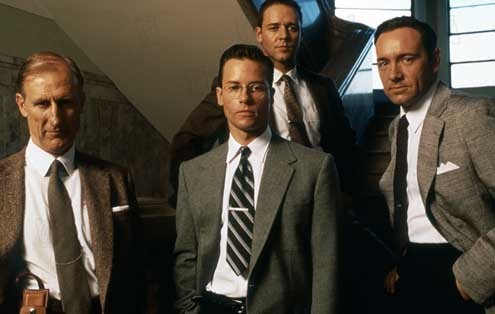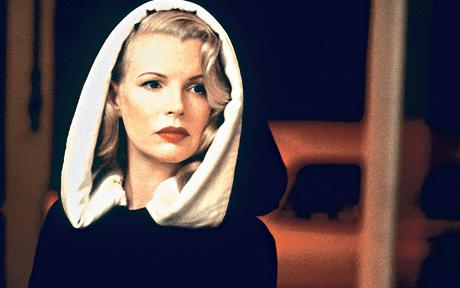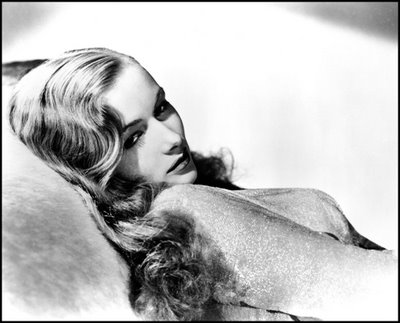L.A. Confidential/1997/Warner Bros./138 min.
Life is good (and glitzy) in 1953 Los Angeles, if you don’t mind smoke and mirrors, hidden crime, rampant racism and more than a few dodgy cops. Corruption in the police force, long an undercurrent in classic noir, takes center stage in “L.A. Confidential,” a wry, stylish and devastating police drama directed by Curtis Hanson.
Hanson sets the tone of glib optimism masking darker secrets by opening the movie with shots of bright and cheerful ’50s postcards, the song “Accentuate the Positive (Eliminate the Negative)” and a Danny DeVito voiceover filling us in on some of the trouble that lurks in paradise.
The sophisticated script, by Hanson and Brian Helgeland, is based on the 1990 novel by James Ellroy, which cleverly weaves in actual Hollywood history while telling the see-speak-and-hear-all-evil story of three cops:
*The jaded and jazzy Det. Sgt. Jack Vincennes (played by Kevin Spacey with a nod to Dean Martin) who pads his bank account by consulting for a TV police show (“Badge of Honor”) and feeding juicy info to “Hush Hush” tabloid columnist Sid Hudgeons (Danny DeVito). Sid meets looming deadlines with set-ups, celebrity exposés and the odd blackmail scheme. (“Hush Hush” magazine is based on the ’50s scandal mag “Confidential” and “Badge of Honor” is based on TV’s “Dragnet.”)
*Det. Lt. Edmund Jennings ‘Ed’ Exley (Guy Pearce), an ambitious newbie with a gift for finessing police politics. Exley wants to make his Dad proud, follows a strict moral code and doesn’t care about being one of the guys. And he won’t be, given that he testifies against his fellow cops and their part in “Bloody Christmas,” a true incident of LA cops beating up Mexican prisoners.
*Officer Wendell ‘Bud’ White (Russell Crowe), a thuggish beefcake who likes to take justice into his own hands, especially when it comes to violence against women. “His blood’s always up,” Exley says of White.
Presiding over the entire force and clashing with Exley in particular is Capt. Dudley Smith (James Cromwell), arrogant but understated until his latent psychopath rears his head.
“Bloody Christmas” is a mere prelude to a detailed catalog of vice and sin, as the story deepens and stretches to accommodate layer after layer of lies, double-dealing, betrayal and cover-up. Funny what can happen when mob leader and “honest haberdasher” Mickey Cohen (Paul Guilfoyle) — a real-life criminal — is getting a time-out in jail.
Central to the tangle is the Nite Owl case, involving kidnapping, rape, robbery and murder, which of course is not what it looks like. White’s ex-partner Dick Stensland (Graham Beckel) was among the bodies found in a dumpy diner, and, in pretty short order, three African-American guys with records end up taking the fall.
Additionally, the three cops find out about an upscale call-girl service, run by the suave, slick and urbane Pierce Patchett (David Strathairn). Patchett’s gimmick: All the girls resemble popular actresses — or they do after a few trips to a plastic surgeon. For instance, there’s a Veronica Lake look-alike named Lynn Bracken (Kim Basinger). Sure enough, such a business did apparently exist in ’50s Tinseltown, as recounted in Garson Kanin’s memoir “Hollywood.”
Bud White proves to be both smart and strong as he asks the tough questions and finds their well-guarded answers, one in the form of a rotten, rat-infested corpse who turns out to be a fellow cop. Shocker!
More storylines surface, such as the romance between Bud and good-hearted golden-girl Lynn, not to be confused with Veronica Lake. (Btw, the Lana Turner mixup scene is a hoot!) And as is the case in noir, it’s not long before Exley meets Lynn and creates a triangle of treachery. As the threads of the story unravel, and we see more darkness and deceit, deadly shoot-outs and bloody dust-ups, it’s clear that all strands lead back to a central source of evil. Hanson and Helgeland, courtesy of Ellroy, tell a tense, crisply paced, funny and chilling story nestled in a near-perfectly rendered world of sun-drenched, sleazy LA.
A hit at the Cannes Film Festival, “L.A. Confidential” also ranked on most major critics Top Ten lists for 1997. The film received Oscar noms for best movie, director, editing, art direction, cinematography, adapted screenplay, supporting actress, sound and music/original dramatic score. Composer Jerry Goldsmith also scored “Chinatown” from 1974 and 1992’s “Basic Instinct.” “L.A. Confidential” won two: Basinger for supporting actress; Hanson and Helgeland for the screenplay.
Hanson’s film stands up beautifully and certainly holds its own among the great neo-noir movies, in the tradition of “Chinatown” and “Body Heat.” Kenneth Turan of the Los Angeles Times sums up the appeal this way: “Its intricate plot is so nihilistic and cold around the heart, its nominal heroes so amoral, so willing to sell out anyone and everyone, that the film is as initially unnerving as it is finally irresistible.”
That said, there are several snags on the accuracy front. We are introduced to Johnny Stompanato (Paolo Seganti) as Lana Turner’s boyfriend, but in reality, the pair didn’t meet until 1957. (The following year, Turner’s teenage daughter Cheryl Crane fatally stabbed Stompanato; it was found to be justifiable homicide.)
And while Mickey Cohen was certainly a major player in the LA underworld, the bigger, though less famous, boss was Jack Dragna, who took over mob business after the murder of Bugsy Siegel in 1947.
Also, Veronica Lake was a 1940s star and, by 1953, her power had faded considerably; the clip that’s shown from “This Gun for Hire” would have been 11 years old. At least Hanson let a 43-year-old actress play the part.
My favorite aspect of “L.A. Confidential” is the stellar performances. (There are 80 speaking parts.) Australians Pearce and Crowe, largely unknown in the U.S. at the time, and Spacey are terrific to watch as their loyalties to each other ebb and flow. Crowe electrifies every scene he’s in and Pearce makes an ideal foil. Spacey coasts through his part with an equal measure of glitz and wit; his brief answer to why he became a cop is stunning. DeVito must have modeled Sid after a mangy dog.
As I mentioned earlier, Basinger won an Oscar for her role as the femme fatale. “She’s one of the few contemporary actresses that you imagine in a George Hurrell photograph—as glamorous as any star in the old studio system,” Hanson said in an AP story from 1997. In the same story, Basinger said of Veronica Lake: “I think she’s more interesting than every character she ever played.”
So do I.













From FNB readers